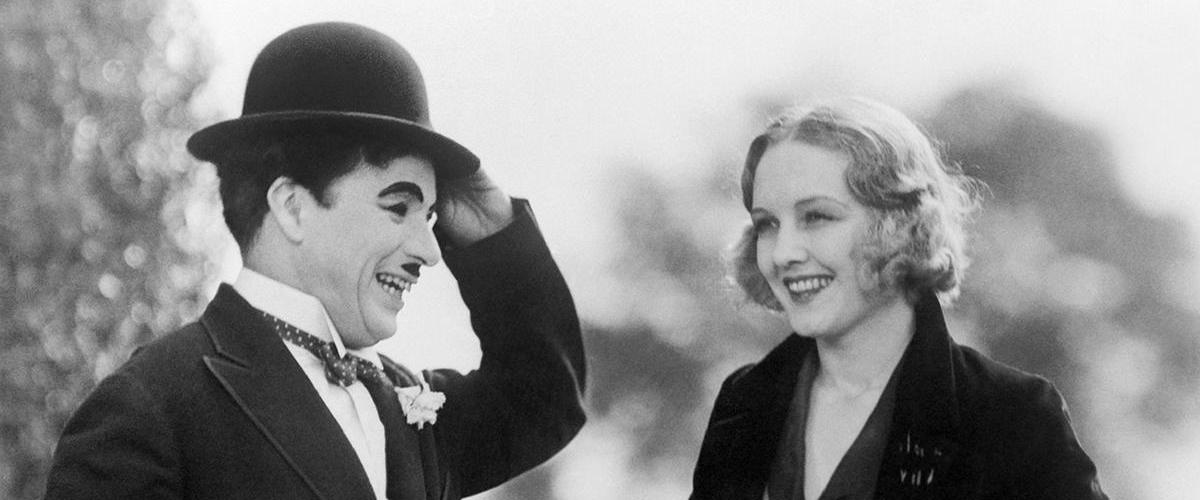Charlie Chaplin’s “City Lights” (1931) came near the beginning of two eras, the Depression and the talkies, and had fun with both. But it didn’t depend upon topical realities for its humor. Chaplin’s films age so well, I think, because his situations grow out of basic human hungers such as lust, greed, avarice. Those are the hungers on the other side, of course — the side inhabited by policemen, millionaires, mayors and boxing promoters. All Charlie sends up against them Is his little Tramp, eternally hopeful, concemed only with escaping from the dilemma of the moment.
“City Lights” was Chaplin’s first production after talking movies were introduced. He avoided sound, wisely as it turns out, since the awkward sound equipment of the early days would have trapped his films in sound stages and sets. Chaplin said at the time (and has been endlessly quoted as saying ever since) that comedy is in long shot, tragedy in close-up. He was right, as a moment’s thought will reveal, and synchronized sound would have made it necessary for the Tramp to spend too much of his time too close to the camera.
The few sounds he does use in “City Lights” underline the silent comedy without distracting us. In the famous opening scene when the mayor unveils a civic statue to find Charlie sleeping in its arms, the mayor’s speech is represented as a series of unintelligible squawks and squeaks. It sounds more speech-like, somehow, than real words would. There’s also the sequence after Charlie swallows the whistle and inadvertently stops a concert, hails a cab and surrounds himself with dogs.
Apart from these two scenes (the first no doubt intended to make his feelings about sound unmistakable), the film is silent, except for the original Chaplin musical score. There is a bare minimum of subtitles, too; everything is made perfectly clear by the genius of Chaplin’s pantomime.
The story involves some of the Tramp’s most familiar adventures. He falls in love with a blind flower-girl, is taken in tow by a drunken millionaire, does a shift as a municipal manure-sweeper (gazing in despair at a parade of horses followed by an elephant) and finally wins the blind girl’s gratitude after a term in jail.
“City Lights” includes one of the funniest sporting events ever filmed, the immortal boxing scene in which Charlie’s footwork bedazzles both the referee and his opponent. It also includes a great deal of sentiment, which some of the 1931 critics found excessive. I don’t think so. Chaplin goes only so far with sentiment, then makes his getaway with a gag.
Sometimes the sentiment and the gag grow so organically out of the situation that you don’t know whether to laugh or not. That’s the case in the opening sequence with the blind flower-girl. Charlie buys a flower, leaves, tiptoes around the corner, positions himself beside a water tap and gazes at her adoringly. She makes her way to the tap, fills her water can, sloshes it around and throws the water into Charlie’s face. His reaction to this misadventure is so complex that comedy hardly seems the word for it.
Note: “City Lights” is the second entry in the Carnegie Theater’s seven-part Chaplin Festival, part of a worldwide tribute to Chaplin that includes a special Academy Award on April 10. The Chicago response to the festival has been amazingly strong, even acknowledging that these perfectly preserved Chaplin prints haven’t been released in years and won’t be shown on television. With a measure of awe in his voice, Oscar A. Brotman, the Carnegie’s owner, was telling me the other day that he had “a few hundred” Chaplin season tickets printed up, offering seven admissions for $10. “1 thought that would be enough,” he said “I had to print more. You know how many more? SO far, we’ve sold 10,000 season tickets.”




















